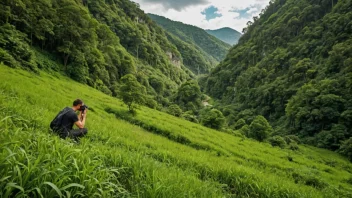In an age where environmental concerns are at the forefront of global discourse, technology emerges as a powerful ally in the quest for sustainable travel. As travelers become increasingly aware of their carbon footprints and the impact of their journeys on the planet, innovative technologies are stepping in to provide solutions that not only enhance the travel experience but also protect our environment. From eco-friendly transportation options to mobile applications that help reduce waste, technology is reshaping how we think about travel and sustainability. This article explores the various ways technology is playing a pivotal role in promoting sustainable travel practices while offering travelers unique experiences that align with eco-conscious values.
Smart Transportation Options
Transportation is one of the largest contributors to greenhouse gas emissions in the travel industry. However, advancements in technology are creating smarter, more sustainable alternatives. Electric vehicles (EVs) are leading the charge, with many cities investing in charging infrastructure to support their use. Car-sharing services and ride-hailing apps are also gaining traction, allowing travelers to access transportation without the need for ownership, thereby reducing the number of vehicles on the road.
Furthermore, public transportation systems are becoming increasingly efficient and user-friendly, thanks to technology. Real-time tracking apps enable travelers to navigate public transport with ease, ensuring they can plan their journeys more effectively. Biking and walking apps promote non-motorized travel, allowing tourists to explore destinations in an environmentally friendly manner.
Eco-Friendly Accommodations
In recent years, the hospitality industry has witnessed a significant shift towards sustainability, driven by technology. Hotels and accommodations are adopting green technologies to improve energy efficiency, reduce waste, and promote eco-friendly practices. From solar panels to smart thermostats, these innovations help lower the carbon footprint of lodging facilities.
Travelers can also take advantage of platforms that specifically list eco-friendly accommodations. Websites and apps that focus on sustainable travel allow users to find hotels and lodges that prioritize environmental conservation, such as those that implement waste-reduction initiatives or use locally sourced materials. This empowers travelers to make informed choices that align with their values.
Waste Reduction Technologies
As travel generates a significant amount of waste, technology plays a critical role in waste reduction strategies. Digital tools such as mobile boarding passes and e-tickets not only streamline the travel process but also reduce paper waste. Additionally, many airlines and travel companies are adopting digital platforms for check-ins and communication, minimizing the need for printed materials.
Moreover, apps that facilitate food sharing among travelers and locals help combat food waste by allowing unused food items to be shared rather than discarded. These initiatives promote a culture of sharing and community while addressing the issue of food waste, which is particularly relevant in tourist-heavy areas.
Carbon Offset Programs
Many travelers are now interested in offsetting their carbon footprints, and technology is facilitating this process. Various online platforms enable travelers to calculate their emissions based on their travel behaviors and purchase carbon offsets to counterbalance their impact. These programs often fund renewable energy projects, reforestation initiatives, and community-based sustainability efforts.
Additionally, airlines and travel companies are increasingly offering carbon offset options during the booking process, making it easier for consumers to contribute to sustainability efforts without requiring significant extra effort. This integration of technology into travel planning encourages environmentally conscious choices and raises awareness about the importance of reducing carbon emissions.
Digital Experiences and Virtual Travel
As travel restrictions and concerns about overtourism grow, technology has opened up new avenues for exploration through digital experiences. Virtual reality (VR) and augmented reality (AR) technologies allow people to experience destinations from the comfort of their own homes. Museums, cultural sites, and historical landmarks are offering virtual tours, enabling individuals to appreciate and learn about different cultures without the environmental impact of travel.
These digital experiences not only help satisfy wanderlust but also encourage travelers to consider the benefits of visiting a destination sustainably in the future. By showcasing the beauty and significance of various locations, technology fosters a greater appreciation for the environment, ultimately motivating travelers to engage with it responsibly.
Community Engagement and Education
Technology plays a vital role in fostering community engagement and education around sustainable travel practices. Social media platforms and travel blogs are rich sources of information, where travelers can share experiences, tips, and recommendations for eco-friendly practices. Influencers and organizations dedicated to sustainable travel are raising awareness about environmental issues and inspiring others to adopt more responsible travel habits.
Moreover, many travel apps now include features that promote responsible tourism by educating users about local customs, wildlife conservation, and environmental regulations. This knowledge empowers travelers to make choices that support the communities they visit and protect the ecosystems they explore.
Conclusion
The intersection of technology and sustainable travel is a promising frontier that offers innovative solutions for reducing the environmental impact of our journeys. From smarter transportation options to eco-friendly accommodations, waste reduction technologies, and digital experiences, technology is transforming how we travel while fostering a greater commitment to sustainability. As awareness grows and technology continues to evolve, the travel industry has the potential to not only thrive but also lead the way in creating a more sustainable future. By embracing these advancements, we can ensure that our love for travel does not come at the expense of our planet.






